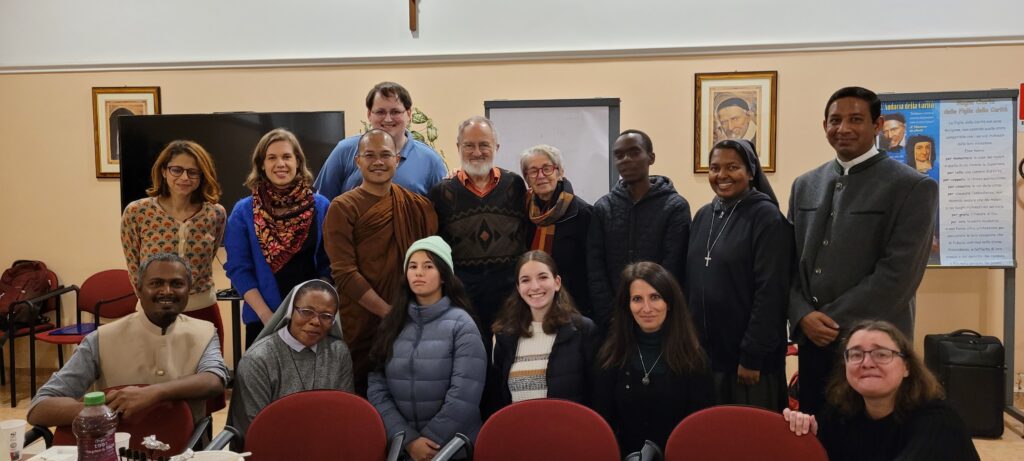Professor Noam Zion’s visit to Rome offered this year’s Russell Berrie Fellows rich opportunities to engage in the study of rabbinic texts and have a personal experience of some Jewish rituals such as the Shabbat dinner and the Hanukkah candle lighting. The events with Prof. Zion in Rome began with two lectures: one on Wednesday, December 14, and the other on Thursday, December 15. These in-person lectures were held at the Angelicum, in the beautiful Sala Torretta, which has a spectacular view out onto Rome’s historical center.
The lectures were entitled “Rabbinic Midrash: Reinterpretation of the Hebrew Bible—Cain and Abel and the Birth of Religious Violence in the First Human Family.” Russell Berrie Fellow Ashin Mandalarlankara (Myanmar) describes Prof. Zion’s teaching as “clear and precise.” Mandalar, a Buddhist monk, also reflects: “Even though our religious beliefs and teachings are so far away from each other, we still have many similarities between the Buddhist and Jewish religions.”
While the Russell Berrie Fellows had already had several online lectures with Prof. Zion, meeting him in person was an even more fulfilling experience. Beyond actively participating by asking questions during the lectures, the Fellows also engaged in Chavruta study: a traditional rabbinic learning method wherein small groups of students engage in the close reading of a text, share their opinions, and debate it. For Russell Berrie Fellow Dr. Maria Petrova (Russia), “reading and commenting on the stories from the Torah with a biblical scholar was an unforgettable experience.”
On Friday, the Fellows and Prof. Zion gathered around 4:30pm for Shabbat Dinner, hosted by Father James Puglisi, at the convent of the Franciscan Friars of the Atonement in Rome, Convento di Sant’Onofrio al Gianicolo. Prof. Zion began the evening by lighting two Shabbat candles and speaking about the history of Shabbat.
Mandalar noted similarities not only between Hanukkah and Buddhist Puja candle-lighting ceremonies, but also between Jewish Shabbat practices and those of the Buddhist Uposatha, days of cleansing, meditation, and reflection. He reflects: “Professor Zion and I had a great conversation about these similarities—we had interfaith dialogue.”
One of the many fascinating topics he focused on was food: historical and traditional meals eaten during Shabbat and other Jewish rituals. After the eating of Challah bread, a special bread associated with Ashkenazi Jewish tradition, everyone shared a meal together. Of the Shabbat dinner, Maria remarks: “On the one hand, it created a cordial atmosphere of a home holiday. On the other hand, celebrating Shabbat in a Christian convent with the representatives of different religions sitting at one table, singing and sharing blessings, food, and wine is the best manifestation of interreligious communication in practice one can imagine.”
Prof. Zion’s time with the Fellows in Rome concluded with a moving Hanukkah celebration on Sunday, December 18. The Fellows gathered at Casa Maria Immacolata in Rome, where Prof. Zion began the afternoon with a lecture on the history of Hanukkah. Next, Prof. Zion led the candle-lighting ritual and performed lovely Hanukkah songs with his wife and two granddaughters.
In the dim room, lit only by the Hanukkah menorah, everyone was given a candle and asked to name a darkness they want to chase out and a light they want to bring to the world. “It was a very emotional moment,” Diana Marinescu, Graduate Administrative Assistant of the JPII Center reflects, “because we could listen to everyone’s personal fears and pains and hopes for the world and for humanity.”
The evening concluded with fun Hanukkah games and with yogurt and chocolate pancakes—a substitute for the Ashkenazi tradition of potato pancakes. “You could tell that sharing Shabbat and Hanukkah with us was very meaningful for Noam,” reflects Russell Berrie Fellow Liz Langan (USA), “and it was lovely to finally meet him and his family!”
“I am extremely grateful to Prof. Noam and his wonderful wife and granddaughters for our lunch together and Hanukkah candle lighting—for this unique opportunity to learn more about Jewish religion and traditions and their great support at this time, difficult for all of us,” shares Maria. “I will be looking forward to meeting Prof. Noam and his lovely family in Jerusalem next year.”

